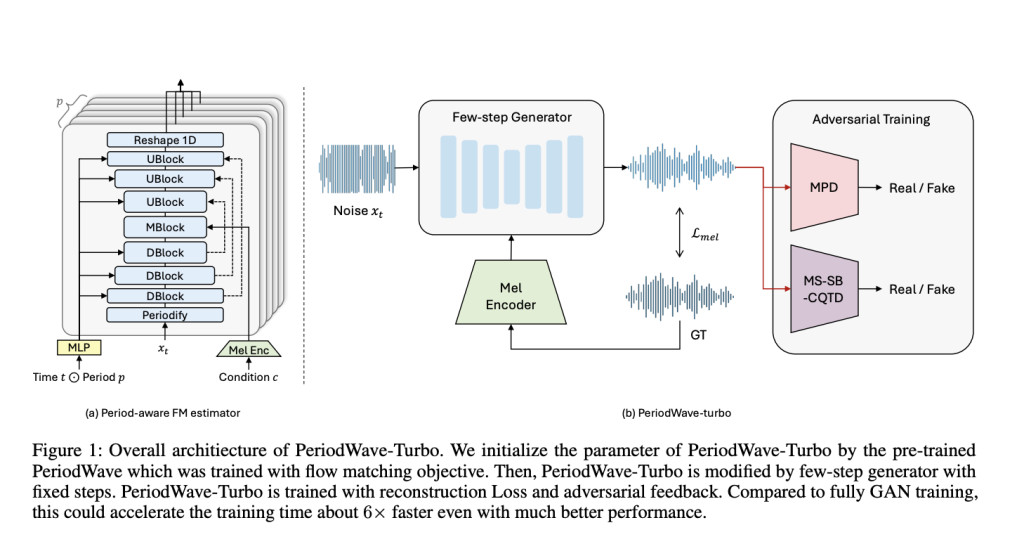Achieving high-fidelity waveform generation in audio synthesis is a significant challenge, particularly due to the slow inference times associated with traditional models like Conditional Flow Matching (CFM), which require numerous Ordinary Differential Equation (ODE) steps. While excellent in quality, these models are often too slow for real-time use. To solve this problem, a team of researchers from Korea have developed PeriodWave-Turbo, a new model designed to speed up waveform generation without losing audio quality. By building on existing CFM models, PeriodWave-Turbo reduces the steps needed to create high-fidelity audio. This makes PeriodWave-Turbo a promising solution for applications needing quick and high-quality audio output.
Waveform generation methods like Conditional Flow Matching (CFM) and Generative Adversarial Networks (GANs) are known for producing high-quality audio. CFM models are particularly good at generating detailed waveforms but usually require many sampling steps, making them slower than GANs, which can generate results in just one step. To improve this, the researchers introduced PeriodWave-Turbo, a model that tweaks pre-trained CFM models to create high-quality waveforms in just a few steps. Using techniques like adversarial flow matching optimization and reconstruction losses, PeriodWave-Turbo speeds up the process while keeping the audio quality intact.
PeriodWave-Turbo improves existing CFM-based waveform generators by simplifying the process to just a few steps. The researchers use a pre-trained CFM model and then apply a fixed sampling method, specifically the Euler method, to generate waveforms in just two or four steps instead of the usual 16. This approach speeds up the process and enhances the quality of the waveforms. The paper reports that this method achieves a high Perceptual Evaluation of Speech Quality (PESQ) score of 4.454 on the LibriTTS dataset, a widely used metric for evaluating speech quality, proving its effectiveness.
Performance-wise, PeriodWave-Turbo demonstrates significant advancements over earlier models. The model ensures that the generated waveforms closely match human hearing by incorporating reconstruction losses, like the Mel-spectrogram reconstruction loss. Additionally, it uses adversarial training with multi-period and multi-scale discriminators to capture the finer details of waveform signals. These techniques not only enhance audio quality but also make the training process more stable and faster. As a result, PeriodWave-Turbo surpasses other GAN-based models and CFM generators, delivering high-quality audio with fewer resources and instilling confidence in its capabilities.
In summary, PeriodWave-Turbo presents a potent solution to the challenges of high-fidelity waveform generation. It overcomes the limitations of traditional CFM models by accelerating audio synthesis while preserving top-notch quality. This innovative approach not only makes waveform generation more efficient but also sets a new standard for future research. Particularly, it holds great promise for real-time audio applications that demand both speed and high quality, fostering optimism about its potential impact.
Check out the Paper and GitHub. All credit for this research goes to the researchers of this project. Also, don’t forget to follow us on Twitter and join our Telegram Channel and LinkedIn Group. If you like our work, you will love our newsletter..
Don’t Forget to join our 48k+ ML SubReddit
Find Upcoming AI Webinars here
The post Breaking Barriers in Audio Quality: Introducing PeriodWave-Turbo for Efficient Waveform Synthesis appeared first on MarkTechPost.
Source: Read MoreÂ



